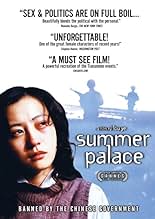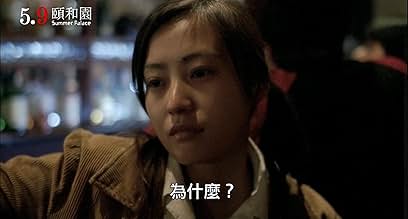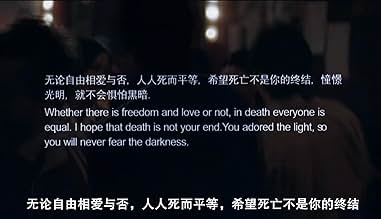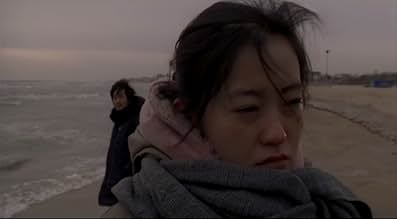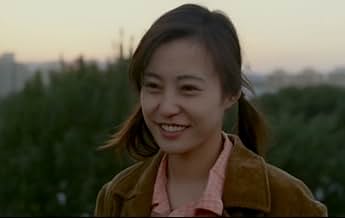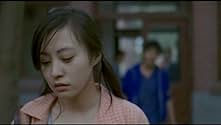IMDb RATING
7.2/10
4.8K
YOUR RATING
Yu Hong leaves her home village and starts university in Beijing, where she develops a consuming and compulsive relationship with another student. The student riots from 1989 then ensue and ... Read allYu Hong leaves her home village and starts university in Beijing, where she develops a consuming and compulsive relationship with another student. The student riots from 1989 then ensue and take a toll on their lives.Yu Hong leaves her home village and starts university in Beijing, where she develops a consuming and compulsive relationship with another student. The student riots from 1989 then ensue and take a toll on their lives.
- Awards
- 1 nomination total
- Director
- Writers
- All cast & crew
- Production, box office & more at IMDbPro
Featured reviews
Having watched the movie myself and reading some of the comments/reviews with regards to the movie prompted me to post something in fairness to the movie.
I feel that the movie was meant to let audience have a feeling that the leads in the movies are lost. If we were to think of the backdrop of the movie, set in the late 80's, Tiananmen incident, the chant for democracy, all this would have let you understand that the China then was not a China that many could understand.
The China up till the 80s was probably such a controlled and suppressed place to live in, and when these suppressed feelings and emotions were suddenly set free, it was like an explosion. The literature and external factors began influencing the way the people viewed and did things. This could explain the "mindless" love making scenes as the desires to love and to have sex were probably something that was not openly displayed or demonstrated. Freedom is what everyone wants, but the maturity to handle the consequence of the actions brought about by freedom might not be something that everyone can handle.
The movie also explores on people who dare not love. All because they fear losing it. I personally felt the characterization was done quite well, and was aptly shown by the character Yu Hong. Love is not something that can be explained logically or defined in any one way. The insight to the characters views and actions in this movie shows that clearly.
Summer Palace is a movie worth watching, but it might not be a movie that is for everyone. Keep an open mind and try and understand the time and country this movie is set in, you'd probably appreciate the movie much better that way.
I feel that the movie was meant to let audience have a feeling that the leads in the movies are lost. If we were to think of the backdrop of the movie, set in the late 80's, Tiananmen incident, the chant for democracy, all this would have let you understand that the China then was not a China that many could understand.
The China up till the 80s was probably such a controlled and suppressed place to live in, and when these suppressed feelings and emotions were suddenly set free, it was like an explosion. The literature and external factors began influencing the way the people viewed and did things. This could explain the "mindless" love making scenes as the desires to love and to have sex were probably something that was not openly displayed or demonstrated. Freedom is what everyone wants, but the maturity to handle the consequence of the actions brought about by freedom might not be something that everyone can handle.
The movie also explores on people who dare not love. All because they fear losing it. I personally felt the characterization was done quite well, and was aptly shown by the character Yu Hong. Love is not something that can be explained logically or defined in any one way. The insight to the characters views and actions in this movie shows that clearly.
Summer Palace is a movie worth watching, but it might not be a movie that is for everyone. Keep an open mind and try and understand the time and country this movie is set in, you'd probably appreciate the movie much better that way.
In the late 1980's, an inexperienced young woman named Yu Hong leaves her hometown and boyfriend in the provinces to attend Beijing University. Almost immediately, she falls into a passionate love/hate relationship with a fellow student at the school. This torrid affair plays out partly against the backdrop of the student protests and subsequent massacre that occurred in Tiananmen Square in the spring of 1989. (The movie also takes place briefly in Germany, the other part of the world where significant social change was occurring in 1989).
"Summer Palace" plays almost like the autopsy of a romantic obsession, attempting to get at the root of why we love in the way that we do. A novice at true love, Yu Hong understands neither her undying passion for Zhou Wei nor her seemingly incessant need to keep sabotaging their relationship. The closest she can come to grasping this paradox is when she says to Zhou Wei: "I want to break up because I can't leave you." Love is seen almost as a form of mental illness in this film - as a debilitating, all-consuming condition that one is powerless to control or "cure" but which, if left unchecked, can become the single dominant force in a person's life (we rarely see Yu Hong studying, let alone going to class). One can attempt to fill the void with other loves, but the heart always comes back to the same place.
"Summer Palace" is long and occasionally repetitious and the political aspects aren't as effectively integrated into the story as they perhaps might have been, but the movie is beautifully acted by Lei Hao and Xiaodong Guo, among others, and features incisive and sensitive direction by Ye Lou (who, along with Feng Mei and Ma Yingli, co-authored the screenplay). This is a largely impressionistic film, concentrating more on mood, imagery and emotions than on narrative. The last hour of the film - so filled with longing and regret as the characters age and attempt to come to terms with the special thing they have lost - is particularly lyrical and heartbreaking and will haunt you long after the movie is over.
All told, "Summer Palace" is an intelligent and moving rumination on that mysterious force we call love.
"Summer Palace" plays almost like the autopsy of a romantic obsession, attempting to get at the root of why we love in the way that we do. A novice at true love, Yu Hong understands neither her undying passion for Zhou Wei nor her seemingly incessant need to keep sabotaging their relationship. The closest she can come to grasping this paradox is when she says to Zhou Wei: "I want to break up because I can't leave you." Love is seen almost as a form of mental illness in this film - as a debilitating, all-consuming condition that one is powerless to control or "cure" but which, if left unchecked, can become the single dominant force in a person's life (we rarely see Yu Hong studying, let alone going to class). One can attempt to fill the void with other loves, but the heart always comes back to the same place.
"Summer Palace" is long and occasionally repetitious and the political aspects aren't as effectively integrated into the story as they perhaps might have been, but the movie is beautifully acted by Lei Hao and Xiaodong Guo, among others, and features incisive and sensitive direction by Ye Lou (who, along with Feng Mei and Ma Yingli, co-authored the screenplay). This is a largely impressionistic film, concentrating more on mood, imagery and emotions than on narrative. The last hour of the film - so filled with longing and regret as the characters age and attempt to come to terms with the special thing they have lost - is particularly lyrical and heartbreaking and will haunt you long after the movie is over.
All told, "Summer Palace" is an intelligent and moving rumination on that mysterious force we call love.
I thought this film was a fascinating portrait of Chinese youth and culture, as they struggle through some astoundingly turbulent times. Coming into maturity while defining love, commitment, and one's self is a challenging part of any youth's life, but all the more so as part of a society that is struggling through the same challenges itself. I found interesting analogies of the Chinese village in the character of Yu Huong, and the big city in Zhou Wei. Somewhere around college age, we all attempt to define what is important to us and explore what we can do, can be, and want. Some of that experience is sorting through our history - family, village, cultural - and deciding what we want to carry forward and embrace, and what to rebel against and discard, and I believe that this film paints a lovely, if gritty, portrayal of modern China doing just that. In their dorm rooms, in the bars and restaurants, in their homes, in their hearts. On the one hand, I would have, aesthetically, enjoyed a more sumptuous, smooth production; but that is not modern China. China (what admittedly little of it I've seen) is gritty, sweaty, crowded, noisy, straining, and that's what I see in this film.
"Because it is only when we make love that you understand that I'm gentle."
That's all the character development I need. This is an ambitious film about the stalled maturation of an idealistic but troubled young woman flanked by the Tiananmen Square protests, the fall of the Berlin Wall, and the handover of Hong Kong to mainland China. The film spans a decade and a half from 1987 to 2003 so I guess the misery of Three Gorges Dam couldn't make the final cut. The direction is a little chaotic at times but it reflects the nature of the film and doesn't come off as too much of a liability. The soundtrack is impeccably chosen and the film is ultimately very sad. I was glued to this 140 minute masterpiece. Politics aside, and they are on the side, this is a remarkable film in its honest portrayal of failure, not of personal character necessarily, but of circumstance.
This is another film that got its director and producer banned for five years from making films in China. Maybe it's the full-frontal nudity or the sheer quantity of sex scenes but I don't see the need for hubbub. The film is about a woman's self-reflection on why she finds comfort in the arms of different men. We see her naked inside and out. She is afraid to love out of fear, fear of something she hasn't yet experienced, but isn't that the scariest kind of fear?
There are a number of things wrong with the film, perhaps, but very little could be done to improve it. Great films succeed in spite of their weaknesses. I'm not a fan of off camera narration but it works for me here. It seems additional rather than necessary. There is a maturity to the woman's voice as she narrates with entries from her diary that compliment, do not seem at odds with, the can't quite grow up activities of the woman on screen. In order to get from the Berlin Wall to the Hong Kong Handover, 1989 to 1997, we're treated to narrative on screen text to fill us in on what's happening to the characters. Ordinarily that would be a deal breaker for me, in theory at least, but again, it works. Finally, as if this were a real story about real people, after the final denouement occurs we're given updates on what happened or didn't happen to the principle characters. Frankly, as gut-wrenchingly sad but true as the final scene is I wish it would have just faded to black. But I think it's a tribute to the strength of the characters that I found myself intrigued by the postscript.
Having said that, I think one could argue that from a strictly script perspective a little more fleshing out was in order ... and I don't mean that full-frontally. I think it comes down to this: if you've ever known passionate, poetic, misguided people, you know these people right away. They're part beautiful and part brutal, there's no talking them out of it. That's the point. This film doesn't set out to explain, diagnose, or change its characters. It just wants to show them to you in all their painful glory, and I think it does a very good job of it. Then again, maybe it's just a case of been there, done that.
That's all the character development I need. This is an ambitious film about the stalled maturation of an idealistic but troubled young woman flanked by the Tiananmen Square protests, the fall of the Berlin Wall, and the handover of Hong Kong to mainland China. The film spans a decade and a half from 1987 to 2003 so I guess the misery of Three Gorges Dam couldn't make the final cut. The direction is a little chaotic at times but it reflects the nature of the film and doesn't come off as too much of a liability. The soundtrack is impeccably chosen and the film is ultimately very sad. I was glued to this 140 minute masterpiece. Politics aside, and they are on the side, this is a remarkable film in its honest portrayal of failure, not of personal character necessarily, but of circumstance.
This is another film that got its director and producer banned for five years from making films in China. Maybe it's the full-frontal nudity or the sheer quantity of sex scenes but I don't see the need for hubbub. The film is about a woman's self-reflection on why she finds comfort in the arms of different men. We see her naked inside and out. She is afraid to love out of fear, fear of something she hasn't yet experienced, but isn't that the scariest kind of fear?
There are a number of things wrong with the film, perhaps, but very little could be done to improve it. Great films succeed in spite of their weaknesses. I'm not a fan of off camera narration but it works for me here. It seems additional rather than necessary. There is a maturity to the woman's voice as she narrates with entries from her diary that compliment, do not seem at odds with, the can't quite grow up activities of the woman on screen. In order to get from the Berlin Wall to the Hong Kong Handover, 1989 to 1997, we're treated to narrative on screen text to fill us in on what's happening to the characters. Ordinarily that would be a deal breaker for me, in theory at least, but again, it works. Finally, as if this were a real story about real people, after the final denouement occurs we're given updates on what happened or didn't happen to the principle characters. Frankly, as gut-wrenchingly sad but true as the final scene is I wish it would have just faded to black. But I think it's a tribute to the strength of the characters that I found myself intrigued by the postscript.
Having said that, I think one could argue that from a strictly script perspective a little more fleshing out was in order ... and I don't mean that full-frontally. I think it comes down to this: if you've ever known passionate, poetic, misguided people, you know these people right away. They're part beautiful and part brutal, there's no talking them out of it. That's the point. This film doesn't set out to explain, diagnose, or change its characters. It just wants to show them to you in all their painful glory, and I think it does a very good job of it. Then again, maybe it's just a case of been there, done that.
This Cannes Festival 2006 entry by the director of Suzhou River and Purple Butterfly (enjoyng very limited US theatrical release in early 2008) is more unwieldy but also bolder and more authentic than its predecessors, while still as moony and emotional and indebted to Wong Kar-wai and the French New Wave. You could compare this to Dr. Zhivago or Splendor in the Grass but despite its intense period flavor at times--the cluttered dorm rooms stay with you as do the rushing demonstrators, and the progression from bikes to nice cars and email is subtle but unmistakable--it hasn't got the structure or plot of the usual generation-spanning films; it's a hymn to love-longing posing as a contemporary historical epic. As such, it's poised for failure and doomed to be dismissed by many. But it's really great fun, a fluent, flowing, committed film with more to think about and respond to than much better-made and more tightly-edited work. And after it was shown at Cannes without official permission from home, it got Lou banned from film-making in China for five years.
Full of intense realistic sex and frontal nudity that would be daring anywhere not to mention China , Summer Palace focuses on a passionate young woman who comes from the country to study at Beijing University just before the Tiananmen Square demonstrations and massacre of 1988, and though it brilliantly evokes the excitement, freedom, and experimentation of that period for what is essentially the director's own generation (Purple Butterfly dealt with the 1930's), and it gives a sense of the chaos and horror that follows--this extended, breathtaking Tiananmen-period sequence is a tour de force--the politics are peripheral to protagonist Yu Hong (Hao Lei) and the intense love addiction she shares with Zhu Wei (Guo Xiaodong). But when the repression comes, Xiao Jun (Cui Lin), Yu Hong's high school boyfriend, with whom she had intense sex at the film's outset, comes to rescue her and take her back to Tumen, in the country. The turbulent give and take of man-woman relationships is as intense at times as anything in D.H. Lawrence, but with a sexual explicitness Lawrence achieved only in Lady Chatterley.
As played by the striking and talented Hao Lei, Yu Hong is a hell of a young woman, beautiful, alive, articulate, philosophical--her diary provides voice-over for many of the film's scenes--willful, and never satisfied with Zhou Wei, but never able till the end (fourteen years later) to let him go either. She doesn't want him, she says, but when she is with him she is happy. Any critique of the movie has to recognize that this is what it's about.
It's quite true that (once again) rain is used excessively, but like many a filmmaker before him Lou Ye recognizes that rain, cigarettes, alcohol and intense sex by good looking people are enough to make a movie atmospheric and sexy and compulsively watchable. Jaunty Chinese pop songs and bursts of passionate classical strings are used with a broad hand, but they always work in context.
Summer Palace is too long, and its wild abandon catches up with it in the diffuse, occasionally irrelevant sequences of the second half. When the political repression comes and Wei goes to Berlin along with Hong's best girlfriend Li Ti (Hu Lingling) and her boyfriend Ryi Gu (Zhang Ziannin), and there are details of the fall of the Berlin Wall and Perestroika that have far less urgency, the whole mood dissipates and the focus meanders. Hong, who's already caught Li Ti with the love of her life Zhou Wei, drifts or rather plunges greedily from one man to another. There's an abortion, a bike accident, adultery, a suicide, and other events, including a bittersweet reunion, but these are just blips in the long meditation on love-longing and life.
Shown at Cinema Village in New York City January-February 2008.
Full of intense realistic sex and frontal nudity that would be daring anywhere not to mention China , Summer Palace focuses on a passionate young woman who comes from the country to study at Beijing University just before the Tiananmen Square demonstrations and massacre of 1988, and though it brilliantly evokes the excitement, freedom, and experimentation of that period for what is essentially the director's own generation (Purple Butterfly dealt with the 1930's), and it gives a sense of the chaos and horror that follows--this extended, breathtaking Tiananmen-period sequence is a tour de force--the politics are peripheral to protagonist Yu Hong (Hao Lei) and the intense love addiction she shares with Zhu Wei (Guo Xiaodong). But when the repression comes, Xiao Jun (Cui Lin), Yu Hong's high school boyfriend, with whom she had intense sex at the film's outset, comes to rescue her and take her back to Tumen, in the country. The turbulent give and take of man-woman relationships is as intense at times as anything in D.H. Lawrence, but with a sexual explicitness Lawrence achieved only in Lady Chatterley.
As played by the striking and talented Hao Lei, Yu Hong is a hell of a young woman, beautiful, alive, articulate, philosophical--her diary provides voice-over for many of the film's scenes--willful, and never satisfied with Zhou Wei, but never able till the end (fourteen years later) to let him go either. She doesn't want him, she says, but when she is with him she is happy. Any critique of the movie has to recognize that this is what it's about.
It's quite true that (once again) rain is used excessively, but like many a filmmaker before him Lou Ye recognizes that rain, cigarettes, alcohol and intense sex by good looking people are enough to make a movie atmospheric and sexy and compulsively watchable. Jaunty Chinese pop songs and bursts of passionate classical strings are used with a broad hand, but they always work in context.
Summer Palace is too long, and its wild abandon catches up with it in the diffuse, occasionally irrelevant sequences of the second half. When the political repression comes and Wei goes to Berlin along with Hong's best girlfriend Li Ti (Hu Lingling) and her boyfriend Ryi Gu (Zhang Ziannin), and there are details of the fall of the Berlin Wall and Perestroika that have far less urgency, the whole mood dissipates and the focus meanders. Hong, who's already caught Li Ti with the love of her life Zhou Wei, drifts or rather plunges greedily from one man to another. There's an abortion, a bike accident, adultery, a suicide, and other events, including a bittersweet reunion, but these are just blips in the long meditation on love-longing and life.
Shown at Cinema Village in New York City January-February 2008.
Did you know
- TriviaIn September of 2006, director Lou Ye was barred from making movies for five years because the film incorporated footage of the Tiananmen Square demonstrations and wasn't approved by Chinese officials. The Chinese government also demanded that all copies of the film be confiscated.
- GoofsThere were no nightclubs or bars in 1980's Beijing such as the ones portrayed in Summer Palace. Despite the presence of a few underground bars in Beijing at that time, it is highly improbably that any university students would patron such establishments. Moreover, those bars did not play American pop music, did not allow dancing, did not stock western liquor, and certainly did not admit foreigners. Any clubs or bars like the ones shown in Summer Palace did not begin appearing in Beijing until the late 1990s and did not gain popularity amongst middle-class college students until after the new millennium.
- ConnectionsFeatures Les Quatre Cents Coups (1959)
- SoundtracksIn Yeon
Performed by Ha Dong-jin
- How long is Summer Palace?Powered by Alexa
Details
- Release date
- Countries of origin
- Official sites
- Languages
- Also known as
- Summer Palace
- Filming locations
- Production companies
- See more company credits at IMDbPro
Box office
- Budget
- $2,500,000 (estimated)
- Gross US & Canada
- $63,045
- Opening weekend US & Canada
- $8,717
- Jan 20, 2008
- Gross worldwide
- $143,027
- Runtime
- 2h 38m(158 min)
- Color
- Aspect ratio
- 1.85 : 1
Contribute to this page
Suggest an edit or add missing content


